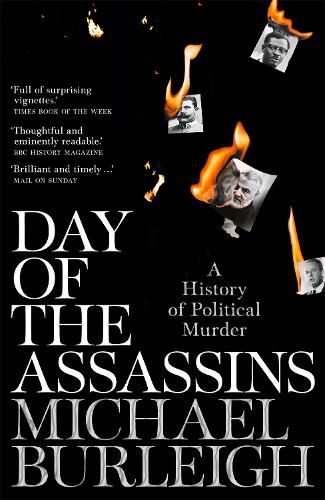Readings Newsletter
Become a Readings Member to make your shopping experience even easier.
Sign in or sign up for free!
You’re not far away from qualifying for FREE standard shipping within Australia
You’ve qualified for FREE standard shipping within Australia
The cart is loading…






‘Written with Burleigh’s characteristic brio, with pithy summaries of historical moments (he is brilliant on the Americans in Vietnam, for example) and full of surprising vignettes’ - The Times ‘Book of the Week’
‘Brilliant and timely … Our world today is as dangerous and mixed-up as it has ever been. Luckily we have Michael Burleigh to help us make sense of it.’ - Mail on Sunday
In Day of the Assassins, acclaimed historian Michael Burleigh examines assassination as a special category of political violence and asks whether, like a contagious disease, it can be catching.
Focusing chiefly on the last century and a half, Burleigh takes readers from Europe, Russia, Israel and the United States to the Congo, India, Iran, Laos, Rwanda, South Africa and Vietnam. And, as we travel, we revisit notable assassinations, among them Leon Trotsky, Hendrik Verwoerd, Juvenal Habyarimana, Indira Gandhi, Yitzhak Rabin and Jamal Khashoggi.
Combining human drama, questions of political morality and the sheer randomness of events, Day of the Assassins is a riveting insight into the politics of violence.
$9.00 standard shipping within Australia
FREE standard shipping within Australia for orders over $100.00
Express & International shipping calculated at checkout
‘Written with Burleigh’s characteristic brio, with pithy summaries of historical moments (he is brilliant on the Americans in Vietnam, for example) and full of surprising vignettes’ - The Times ‘Book of the Week’
‘Brilliant and timely … Our world today is as dangerous and mixed-up as it has ever been. Luckily we have Michael Burleigh to help us make sense of it.’ - Mail on Sunday
In Day of the Assassins, acclaimed historian Michael Burleigh examines assassination as a special category of political violence and asks whether, like a contagious disease, it can be catching.
Focusing chiefly on the last century and a half, Burleigh takes readers from Europe, Russia, Israel and the United States to the Congo, India, Iran, Laos, Rwanda, South Africa and Vietnam. And, as we travel, we revisit notable assassinations, among them Leon Trotsky, Hendrik Verwoerd, Juvenal Habyarimana, Indira Gandhi, Yitzhak Rabin and Jamal Khashoggi.
Combining human drama, questions of political morality and the sheer randomness of events, Day of the Assassins is a riveting insight into the politics of violence.